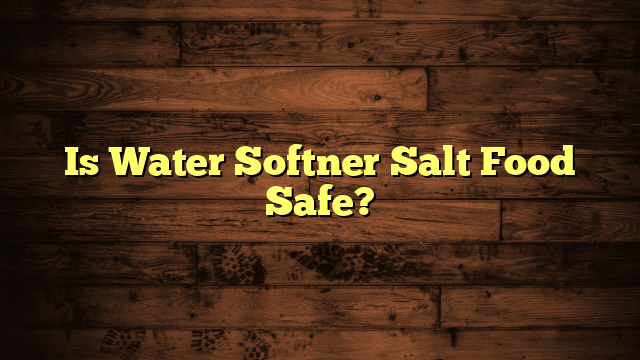Is Water Softner Salt Food Safe?
You might think that water softener salt could double as a seasoning for your favorite dish, but that's a risky assumption. While it primarily consists of sodium chloride, this type of salt often harbors impurities and additives that could jeopardize your health. The stark differences between food-grade and water softener salt raise important questions about safety and suitability for cooking. So, how do you determine what's safe to use in your kitchen? Understanding these distinctions could be vital for your culinary practices.
Key Takeaways
- Water softener salt is not intended for consumption and may contain impurities harmful to health.
- It typically has lower purity levels compared to food-grade salts.
- Additives in water softener salt can negatively affect its safety for culinary use.
- High sodium content in water softener salt can pose risks for those on low-sodium diets.
- Safe cooking alternatives include natural sea salt, herbs, and spices instead of water softener salt.
What Is Water Softener Salt?
Water softener salt is an integral component in the process of softening hard water. When you use a water softener, you're often dealing with different water softener types, each designed to tackle specific hardness levels.
Salt plays a vital role here, as it helps in the ion exchange process that removes minerals like calcium and magnesium from your water.
You might be surprised to learn that there are various salt alternatives available, too. These alternatives can range from potassium chloride to more environmentally friendly options.
While traditional salt is effective, some people prefer these alternatives for health reasons or to reduce sodium intake.
Understanding your water softener type can guide you in selecting the right salt or alternative to use. For instance, if you have a high-efficiency softener, you might want to choose a specific type of salt that complements its design.
Ultimately, whether you stick to traditional salt or opt for an alternative, keeping your system well-maintained will guarantee you enjoy the benefits of softened water—like cleaner dishes and softer skin.
Composition of Water Softener Salt
When you think about water softener salt, it's crucial to understand its main component: sodium chloride.
However, not all salt is created equal; many varieties contain impurities and additives that can affect its overall quality.
Sodium Chloride Basics
Sodium chloride, commonly known as table salt, is the primary component of water softener salt. This compound, derived from various sodium sources, is vital in many culinary applications. When you sprinkle salt on your food, you're using sodium chloride to enhance flavor and preserve ingredients.
In the context of water softening, sodium chloride plays an important role. It helps remove hard minerals like calcium and magnesium from your water supply. This process improves your water's quality, making it more effective for cleaning and protecting your plumbing.
While table salt is generally safe for consumption, the form of sodium chloride found in water softener salt isn't intended for culinary use. It may contain additives or impurities unsuitable for food. Always check product labels to verify you're using the right type of salt for your needs.
Understanding sodium chloride can help you make informed decisions about its use, whether in cooking or treating your water. By recognizing the differences in salt types, you can better appreciate the roles they play in your daily life, confirming you're using them safely and effectively.
Impurities and Additives
Understanding the composition of water softener salt is essential for anyone considering its use. While sodium chloride is the primary component, you should be aware of potential impurities and additives that may accompany it. Impurity sources can include contaminants from mining processes or packaging materials, which may introduce unwanted substances into the salt. Additive concerns are also significant; some manufacturers may include anti-caking agents or chemicals that can affect the salt's purity.
Here's a table summarizing common impurities and additives found in water softener salt:
| Impurity/Additive | Source | Potential Concern |
|---|---|---|
| Calcium Carbonate | Natural mineral deposits | Can reduce softening efficiency |
| Magnesium Sulfate | Mining byproducts | May affect taste if ingested |
| Sodium Bicarbonate | Processing agents | Can alter chemical balance |
| Iron Oxide | Contaminated sources | Can stain fixtures and appliances |
| Anti-caking agents | Added by manufacturers | May not be food safe |
Purpose of Water Softener Salt
Water softener salt serves an essential role in the process of treating hard water, which is filled with minerals like calcium and magnesium.
By using this salt, you're helping to prevent scale buildup in your plumbing and appliances, ultimately extending their lifespan.
Understanding its intended uses and applications can also clarify whether it's safe for human consumption.
Composition of Water Softener
Using water softener salt plays a significant role in the process of ion exchange, which effectively reduces hard minerals like calcium and magnesium in your water supply. This process is essential for managing water hardness, as these minerals can cause scaling on appliances and plumbing fixtures.
When you add salt to your water softener, it creates a brine solution that facilitates the exchange of sodium ions for the hard minerals in the water.
The composition of water softener salt typically includes sodium chloride, but you may also find potassium chloride in some products. Both types help maintain a proper mineral balance in your water.
By replacing calcium and magnesium ions with sodium or potassium, you're fundamentally softening the water, which can lead to improved efficiency for soaps and detergents, making cleaning easier.
Maintaining a proper mineral balance is crucial for various household tasks, from washing dishes to doing laundry.
Intended Uses and Applications
The primary purpose of water softener salt is to enhance the quality of your household water by effectively managing its hardness.
By reducing hardness, you not only improve the taste of your water but also protect your plumbing and appliances from scale buildup.
When your water is softer, it can lead to more efficient cleaning and better cooking practices.
Here are some common applications of water softener salt:
- Household water systems: Softening water helps prevent mineral buildup in pipes and fixtures.
- Laundry: Softer water enhances detergent effectiveness, leading to cleaner clothes.
- Dishwashing: It improves the cleaning power of dishwashing detergents, resulting in spotless dishes.
- Cooking: Using softened water can enhance the flavors in your meals, making for a better overall dining experience.
Safety for Human Consumption
When it comes to safety, water softener salt isn't meant for human consumption. This salt is specifically designed for household appliances and has different purity levels compared to food-grade salt. Consuming it can pose risks to human health, so it's vital to understand its intended use.
Here's a quick comparison of water softener salt and food-grade salt:
| Type | Purity Level | Safety for Consumption |
|---|---|---|
| Water Softener Salt | Lower purity; contains additives | Unsafe for human consumption |
| Food-Grade Salt | High purity; no additives | Safe for human consumption |
| Sea Salt | Varies; often contains minerals | Generally safe, depending on source |
It's important to follow consumption guidelines when it comes to salt. While water softener salt may seem harmless, it can contain impurities or additives that aren't suitable for eating. Always opt for food-grade salt for your culinary needs. Remember, safety first! By knowing the differences, you can protect your health and guarantee that you're using the right products for cooking and consumption. Stay informed to make safe choices!
Differences Between Salts
Throughout history, salt has played an essential role in both culinary practices and industrial applications, yet not all salts are created equal.
When you explore the different types of salts, you'll notice variations in mineral content and uses that can greatly impact your cooking experience. Understanding these differences can help you choose the right salt for your needs.
Here are some common types of salts and their unique characteristics:
- Table Salt: Highly refined with added iodine, it's the most common culinary salt.
- Sea Salt: Harvested from evaporated seawater, it retains trace minerals that can enhance flavor.
- Himalayan Pink Salt: Known for its mineral content, it's often touted for its health benefits and distinctive color.
- Kosher Salt: Coarser in texture, it's favored by chefs for its ease of handling and ability to draw moisture from meats.
Each type of salt brings its own flavor profile and texture, so it's vital to reflect on what'll complement your dishes.
Health Risks of Water Softener Salt
While water softener salt can effectively treat hard water, it's crucial to be aware of the potential health risks associated with its use. One significant concern is the high sodium content in water softener salt. If you're on a low-sodium diet or have health conditions like hypertension, consuming water softened with this salt can pose serious health risks. Elevated sodium levels can lead to increased blood pressure and other cardiovascular issues.
Moreover, some water softeners may introduce other contaminants into your water supply, depending on the type of salt used. If you're using rock salt, for instance, impurities may be present that could affect your health.
It's also important to remember that while the salt itself isn't inherently toxic, it can alter the taste of your drinking water, potentially leading to reduced safe consumption.
To mitigate these risks, consider using a reverse osmosis system for drinking water or exploring alternative water softening methods that don't rely on sodium.
Regulatory Guidelines and Standards
Understanding the potential health risks of water softener salt highlights the significance of adhering to regulatory guidelines and standards. Various regulatory agencies, such as the Environmental Protection Agency (EPA) and the Food and Drug Administration (FDA), set safety standards to guarantee that products used in food preparation are safe for consumption. This is vital, as improper use of water softener salt can lead to contamination.
When it comes to safety standards for water softener salt, consider the following:
- Quality Control: Manufacturers must adhere to strict quality control measures to guarantee their products meet safety requirements.
- Labeling Requirements: Clear and accurate labeling helps consumers understand the product's intended use and any associated risks.
- Testing Protocols: Regulatory agencies often mandate rigorous testing protocols to evaluate the safety of water softener salt.
- Consumer Education: It's essential for consumers to be educated about the proper uses and potential dangers of water softener salt.
Safe Alternatives for Cooking
When it comes to cooking, your kitchen deserves safe and reliable ingredients. If you're looking for cooking substitutes, you'll find plenty of options that guarantee culinary safety without compromising flavor.
For instance, instead of using salt from a water softener—which can contain additives unsuitable for consumption—opt for natural sea salt or kosher salt. These alternatives not only enhance taste but also keep your meals safe.
If you're avoiding sodium entirely, consider using herbs and spices as flavorful alternatives. Garlic powder, paprika, or even a squeeze of lemon juice can elevate your dishes without the health risks associated with certain salts.
For a richer flavor profile, try using nutritional yeast or smoked paprika, which can both add depth to your cooking.
If you're in need of a texture substitute, consider using unsweetened applesauce or Greek yogurt in baking, as they provide moisture without compromising safety.
Final Thoughts on Safety
Making certain your cooking ingredients are safe is essential for your health and well-being. When it comes to water softener salt, understanding its implications for food safety is vital. While it's commonly used in households, it's not designed for culinary use. You should always prioritize safety precautions to protect yourself and your family.
To enhance your consumer awareness regarding food safety, consider the following points:
- Read labels carefully: Always check for any warnings or usage guidelines.
- Choose food-grade salt: Opt for salt specifically labeled as food-safe for cooking.
- Avoid cross-contamination: Keep cooking ingredients separate from non-food substances.
- Educate yourself: Stay informed about safe food handling practices.
Ultimately, it's up to you to make informed choices. If you're unsure about a product's safety, err on the side of caution.
Remember, your health and well-being are worth the extra effort. By being vigilant and proactive, you can guarantee that what you put in your body is safe and beneficial.
Embrace consumer awareness, and you'll navigate the world of cooking ingredients with confidence.
Frequently Asked Questions
Can I Use Water Softener Salt in Food Preservation?
You shouldn't use water softener salt for food preservation. Different salt types exist, and water softener regulations often classify this salt as non-food grade, making it unsafe for culinary applications or food storage.
What Brands of Water Softener Salt Are Considered Food Safe?
When considering food-safe brands of water softener salt, look for those labeled as food grade. You might also explore salt alternatives like potassium chloride, which can be safer and more suitable for food preservation.
How Does Water Softener Salt Affect Cooking Times?
Water softener salt doesn't typically affect cooking times. However, if you're using it in food preparation, the salt concentration might influence cooking efficiency, potentially leading to quicker boiling or altered flavors in your dishes.
Is Water Softener Salt Effective for Brining Meats?
Did you know that 85% of chefs prefer brining for tender meat? While water softener benefits include softening water, it's not ideal for meat brining techniques, as it may contain additives unsuitable for consumption.
Can Water Softener Salt Be Used in Baking Recipes?
You shouldn't use water softener salt in baking recipes. It isn't intended for food, so consider salt alternatives like kosher or sea salt. Prioritize baking safety by choosing ingredients specifically meant for culinary purposes.
Conclusion
In summary, while water softener salt serves its purpose in treating hard water, it's not safe for cooking or food preparation. Its impurities, additives, and high sodium content pose health risks. To guarantee your meals are safe and healthy, stick to food-grade salts that are pure and regulated. Remember: for your water, use softener salt; for your table, choose food-grade salt. Prioritize your health by making informed choices in the kitchen.







